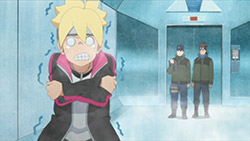 |
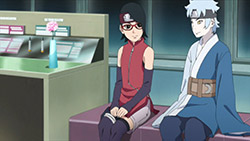 |
 |
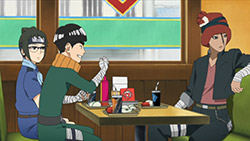 |
 |
 |
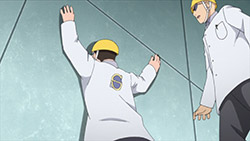 |
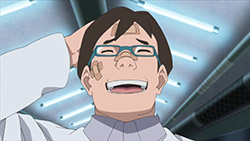 |
 |
 |
 |
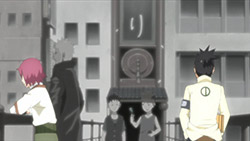 |
 |
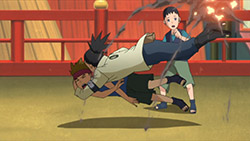 |
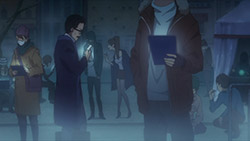 |
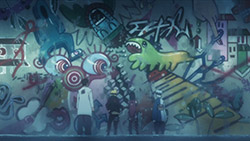 |
 |
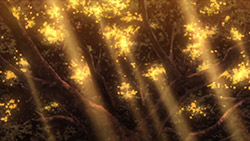 |
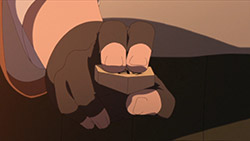 |
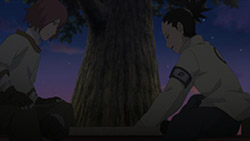 |
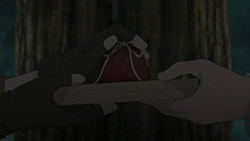 |
 |
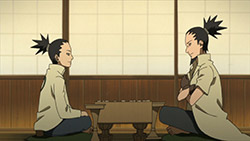 |
 |
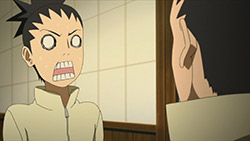 |
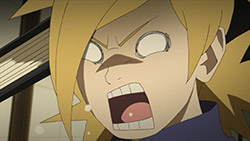 |
 |
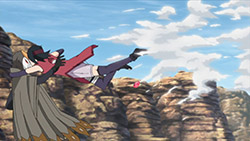 |
 |
 |
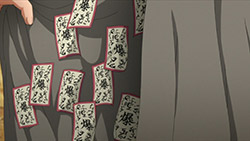 |
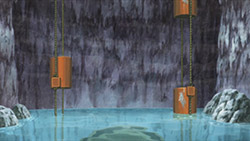 |
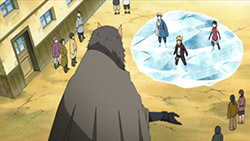 |
 |
 |
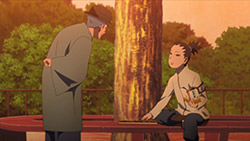 |
“The Byakuya Gang Surfaces”
Unexpected Friendship
Unlikely friendships always strike a warm chord in my heart. Also, the qualms of movie watchers may have been assuaged, where Boruto’s connection to Katasuke is finally clarified. From the perspective of someone who has seen the movie, it really makes sense that Katasuke has actually been close to the Uzumaki family for quite some time. This would explain why Boruto deeply trusts him as well, and I hope that others will be similarly satisfied as to how this might substantiate future events. Seeing Naruto being pestered repeatedly over the latest gadgets made me laugh, and as always, it was great to see how science and technology have come a long way in this world.
The other unlikely friendship formed between Shikadai and the bandit boy from the Byakuya Gang. Just like his father, Shikadai is shown to have old man smarts. However, it actually causes issues, where he feels frustrated at the lack of challenge from a peer that can intellectually match him. Consequently, we can see his disconnect from the current generation, where his maturity and intelligence somewhat alienates him from the crowd. In this episode, he meets his match. A boy who can keep toe to toe with him on the shogi board, despite having never played before. Does it seem fateful that later on in the arc, this unnamed boy will become a future antagonist?
It’s hard to say. He clearly has noble intentions, seeing how he described the Byakuya Gang to be a proverbial pawn that protects the villagers. This would suggest to me that he’s being manipulated by the mercenary with the mohawk. If we were to draw parallels to the situation between Kagura and Shizuma, then the probability of a turnaround is quite high. Speculation aside, I’m just looking forwards to seeing some sweet shinobi action, packed full of the ice kekkai genkai!
The Consequences of Capitalism
The stark wealth inequality we see in Konohagakure should be a familiar sight. It provides ample parallels with the effects of capitalism, that are also visible in most first world countries. However, the detriments run far deeper too compared to the norm. I don’t know what Naruto is doing as Hokage, but a lot of criticism should fall onto him. Perhaps in a post-war period, Konohagakure’s administration has been ill-equipped to deal with the unprecedented expansion experienced, following something of an industrial revolution. It’s understandable that not everyone can be as prosperous as the city folks. But things have gone too far. The fact that these fringe villages lack food supplies and clean water is quite disgraceful, especially the city centre easily possess all these basic necessities.
I understand why Boruto feels so crushed and disappointed, something that Konohamaru misunderstands. It’s not because our young protagonist failed his mission. Rather, he is the son of a man who people laud as great, yet holds a great responsibility in being unable to alleviate the intense suffering of these impoverished villagers. As the son of such a leader, I can see why Boruto feels so much guilt, especially considering how he had his prior convictions shattered. Stealing is stealing, but he seems to realise that he and his peers are allowed to live lives of luxury, while other people in Konohagakure are dying of starvation and thirst.
Concluding Thoughts
Something is fundamentally wrong with the economic system. Many people would argue that it is unfair to take away wealth, from the people who have earned it. Though I largely agree with the unfairness of the previous scenario, I have a single stance on this matter. There comes a point where people start struggling so badly, that increased taxes against corporations and wealthy individuals should be levied, to raise the necessary funds that can aid these fringe villages.
Boruto deserves recognition for its ongoing commitment to exploring socio-economic problems, despite being a kid’s show. It might lack depth, but more importantly, it conveys the topic through a simple message. Is it right to steal from the rich and give to the poor, a la Robin Hood? As a law student, I think that stealing is absolutely wrong and is difficult to justify on any ground. But if the government aren’t upholding their duty – that is to say their responsibility to run the country – then my emotions would make me very sympathetic towards these thieves. Funnily enough, I didn’t think a day would come, where I would suggest that Naruto’s leadership requires questioning. However, Konohagakure’s administration clearly suffers from deep flaws, and to that end, I sincerely hope that this intriguing matter will continue to be addressed throughout the run of this series.
Preview
 |
 |
 |

https://randomc.net/image/Boruto%20Naruto%20Next%20Generations/Boruto%20Naruto%20Next%20Generations%20-%2043%20-%20Large%2015.jpg
Watch Dogs?
Glad someone notice. This would actually be something a hacker-based ninja could thrive in
Yes, I also like how they’re exploring Konoha’s new reality, blending the past and the present. No Medieval Stasis for the Naruto world. I’d say that it feels like it happened too quickly (true, Naruto already had places and settings that wouldn’t feel too out of place in our world), but as with other anime, I suspect we’re seeing Japanese tropes playing: for them, industrialization was really that quickly.
I didn’t expect Katasuke of all people appearing in this episode and, frankly, his role could have been performed by any other person. But I appreciate the writers’ decision to introduce him earlier. A positive first contact, which mirrors the developments in the manga. Like decisions with Sumire and others, I believe that the people behind the anime and the manga have agreed on a common direction and approach on certain matters and now we’re seeing the consequences. Good consequences, I mean.
But is it really Naruto’s fault? A part of the setting that hasn’t been explored very often (but given Boruto’s record, I wouldn’t be surprised if the anime tackles it sooner or later) is that the ninja villages, including Konoha, are basically city-states. They don’t rule anything beyond the borders of the city, and I’m not sure that poor village falls under his jurisdiction and not the Fire Daimyo’s.
The effects of a rich city on its surrounding region are already hard to manage. If they belong to different administrations, it becomes even more difficult, as it happens in real-life too.
(Who bets this ‘Robin Hood’ arc will finish with Naruto agreeing to give some help to the surrounding villages as some kind of ‘external aid’?)
I agree with you. The villages, or at least Konoha definitely seem like their own city states within the respective territories. Not sure why it is Konohas fault specifically that some random small village doesn’t have everything they need to survive. Did someone force them to live there? Can they move somewhere else? In this case, they chose to settle in a very specific area where the only way to get water is some contrived and apparently expensive apparatus. Once again, how is that Konohas fault? Couldn’t they settle at the bottom near the water?
Like you said, it’ll probably be solved with some sort of aid from Naruto, but that’ll just give more people an excuse to start dingy villages of their own and then beg for aid when things go south.
My guess is that it’s probably not that easy. It could be that there’s a economic resource nearby, like a mine, and it makes more sense to be closer to it (in which case moving near the water source wouldn’t solve anything, because the problem would be the opposite). Or their secluded and hard to reach location may be due to war times, where settling in a safer place was more important than comfort. Both situations have been very common in real life.
I’ve also been thinking that it may be a matter of technology. Perhaps they had a more traditional system in place (like a windmill), they replaced it with machines, and everything went well until they broke down and there was no money to repair them. The previous story in Boruto also showed another village that had invested a lot in a new facility (the bridge), only to bring them unexpected trouble.
Rural urban wealth divide is a huge issue with many developing even developed countries. The education systems aren’t equal, opportunities aren’t equal, even cultures and mindsets aren’t the same. How do you go to a group of people who have been living a certain way for generations, and say ‘behold our advancements. If you do not follow and learn you will be left behind’?
Although I won’t blame Naruto for his surrounding villages. After all, Konoha is Konoha, the military village state, and the Daimyos are in control of the rest of the country. Given the general mindset and actions of historical Daimyos of Japan, it is very realistic that they may just not care about the peasant class until the peasants are at their doors.
https://randomc.net/image/Boruto%20Naruto%20Next%20Generations/Boruto%20Naruto%20Next%20Generations%20-%2043%20-%20Large%2032.jpg
Who is right here?
https://randomc.net/image/Boruto%20Naruto%20Next%20Generations/Boruto%20Naruto%20Next%20Generations%20-%2043%20-%20Large%2003.jpg
https://randomc.net/image/Boruto%20Naruto%20Next%20Generations/Boruto%20Naruto%20Next%20Generations%20-%2043%20-%20Large%2029.jpg